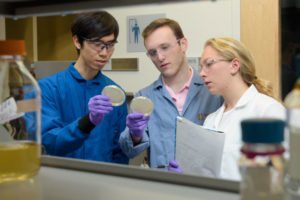
Four undergraduate students looking to develop antibiotic treatments to multidrug-resistant bacteria recently received a $10,000 grant from Stanford’s chemistry, engineering & medicine for human health (ChEM-H) department for their biotechnology startup.
The students involved in the startup, Christian Choe ’17, Maria Filsinger Interrante ’17, Zach Rosenthal ’17 and Catherynn Vuong ’16, met through a ChEM-H entrepreneurship research program led by chemistry and chemical engineering professor Chaitan Khosla. Khosla introduced the program during CHEM 181: “Biochemistry I,” which all four students were taking at the start of the academic year. The program, which was new as of the last academic year, seeks to continue offering mentorship and resources to students interested in biotechnological entrepreneurship.
“We thought it would be interesting to help students see the context of what they learn in a real world setting,” Khosla said.
The students were eager to take advantage of the unique opportunity to understand biotechnology in an entrepreneurial setting.
“At Stanford, there’s certainly a startup culture,” Rosenthal said. “But when it comes to the biosciences, it seems like that was lacking. I love the entrepreneurial attitude at Stanford, and I certainly have a passion for the sciences and have some experience with lab work, so it just seemed like a great opportunity.”
With an increase in antibiotic use, variations and mutations in bacteria have evolved to become resistant to those antibiotics already available. Researchers recently encountered the first individual to carry the bacteria impervious to colistin, the so-called “last resort” antibiotic.
“The reason why I was interested in antibiotics was that it was a big unmet medical need,” Choe said. “Big pharmaceutical companies aren’t really interested in pursuing the development of antibiotics because it’s not as profitable and also because bacteria is developing relatively quickly.”
The team has been putting together a plan to study Pseudomonas aeruginosa and Acinetobacter baumannii, both of which are bacteria with strong resistance to antibiotics.
Starting out with more low-risk bacteria, the team is testing their antibiotic against E. coli this summer. If proved successful, the group will be testing resistance of Pseudomonas aeruginosa and Acinetobacter baumannii with their antibiotic proteins.
“I would say we’re in preliminary testing,” Interrante said. “We have the proteins that we want to work with, and we’re starting to see how they work. We haven’t demonstrated our final result yet; we want to, and we’re definitely making progress towards that.”
Although the team has a lot of work left to do, they are optimistic about the future, especially given the qualities that each individual brings to the table.
“I think that every one of us provides something that we are ungodly good at,” Rosenthal said. “We each make unique contributions to the team. All four of us aren’t the same, and that’s good because it provides some intellectual diversity.”
Contact Ethan Teo at ethanteo99 ‘at’ gmail.com and Nicole Chen at 19nicolec ‘at’ students.harker.org.
